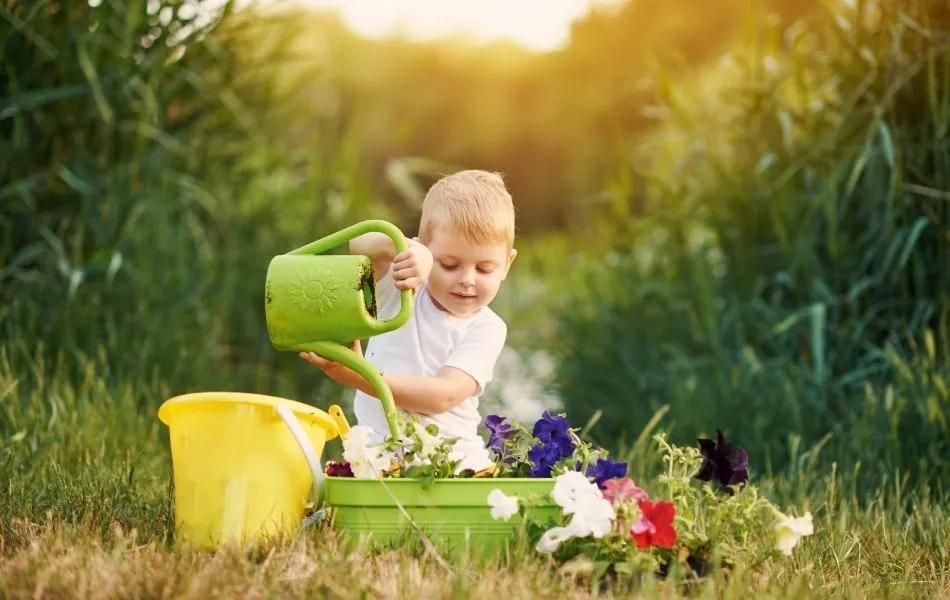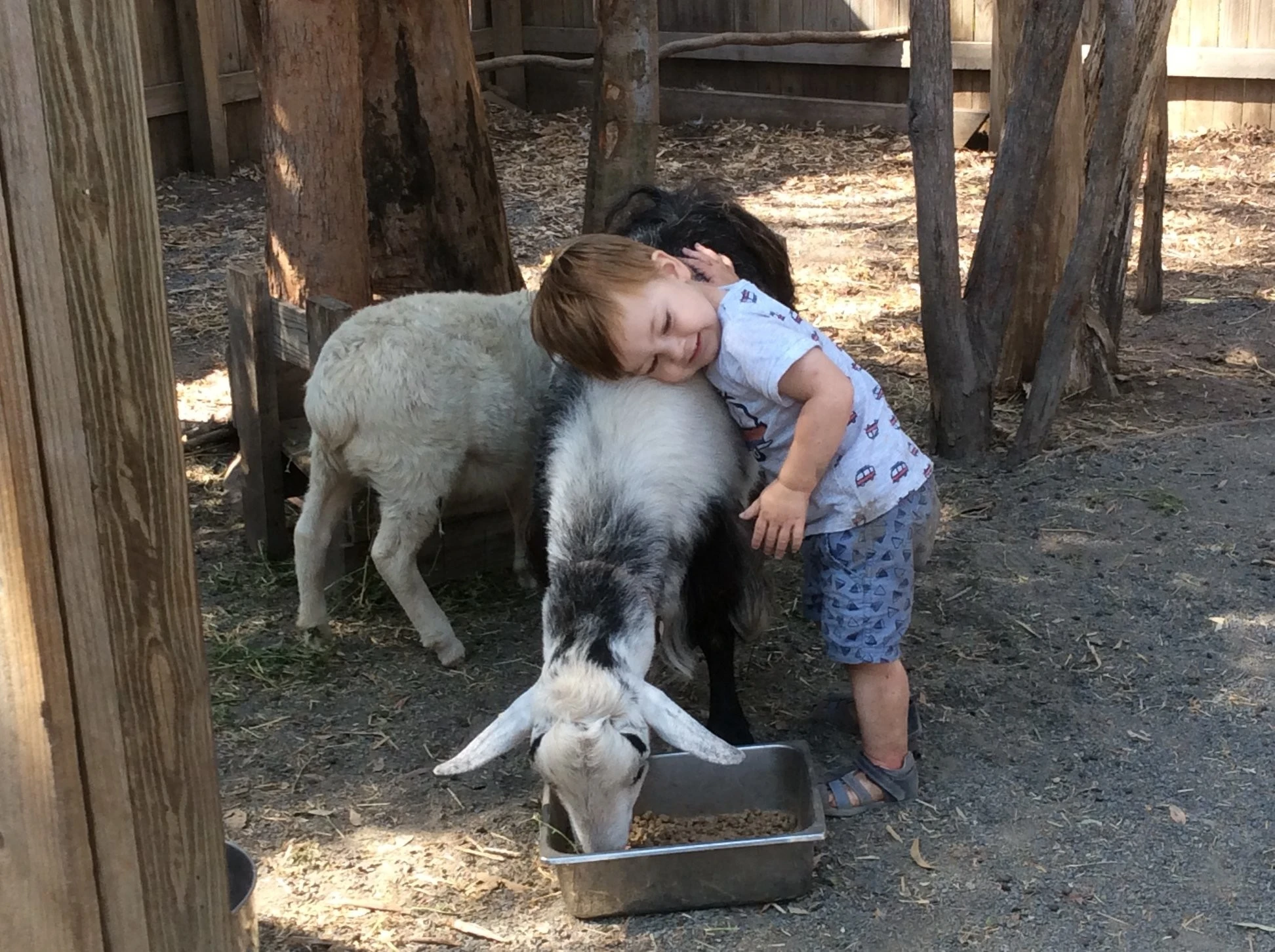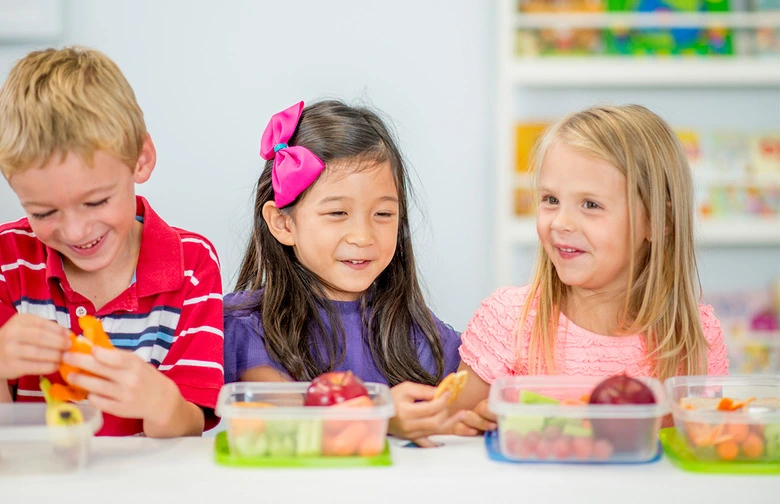Prekg - Active Learning
Monday to Thursday
8:30 AM - 8:40 AM
Healthy Break
|
Monday to Thursday
8:40 AM - 9:10 AM
Study of nature
|
 Monday to Thursday
9:10 AM - 10:40 AM
STEM
|
Monday to Thursday
10:40 AM - 10:50 AM
Healthy Break
|
Monday to Thursday
10:50 AM - 11:20 AM
Language
|
Monday to Thursday
11:20 AM - 11:50 AM
Stories and Poems
|
Monday to Thursday
11:50 AM - 12:50 PM
Lunch Break
|
Monday to Thursday
12:50 PM - 1:50 PM
STEM
|
Healthy Break
At Zenkids Preschool, we understand the importance of providing nutritious and balanced snacks to support the growth and development of our young learners. Our healthy break schedule is designed to offer a variety of wholesome options that cater to the dietary needs of children, ensuring they stay energized and focused throughout the day.
Here’s our weekly healthy break schedule:
Monday
Morning Break 1 ( 8.30 to 8.40 AM): Sandwiches
- Made with whole grain bread and filled with healthy ingredients to provide balanced nutrition
Morning Break 2 ( 10.40 to 10.50 AM) : Fruit juice made with real sugar cane without water and white sugar.
- A delicious mix of fresh, seasonal fruits offering a variety of vitamins, minerals, and natural sugars.
.webp)
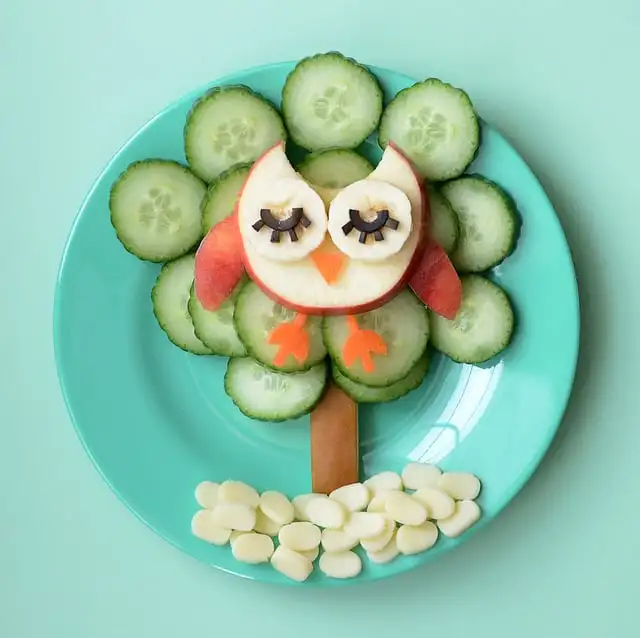
Tuesday
Morning Break 1 ( 8.30 to 8.40 AM): Vegetable salad with seasonal vegetables
- Fresh, locally sourced vegetables providing essential vitamins and minerals
Morning Break 2 ( 10.40 to 10.50 AM) : Fruit juice made with real sugar cane without water and white sugar.
- A delicious mix of fresh, seasonal fruits offering a variety of vitamins, minerals, and natural sugars.
Wednesday
Morning Break 1 ( 8.30 to 8.40 AM): Boiled Egg
- A high-quality protein source, also providing essential vitamins and healthy fats.
Morning Break 2 ( 10.40 to 10.50 AM) : Fruit juice made with real sugar cane without water and white sugar.
- A delicious mix of fresh, seasonal fruits offering a variety of vitamins, minerals, and natural sugars.
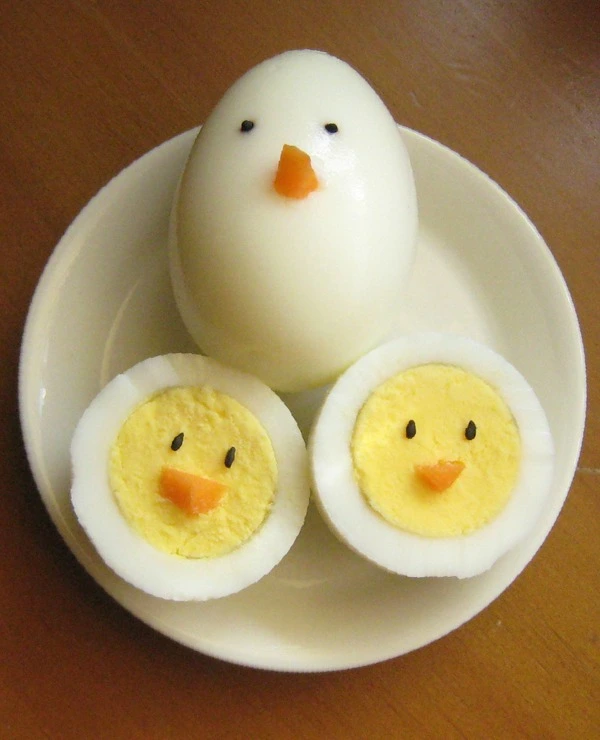

Thursday
Morning Break 1 ( 8.30 to 8.40 AM): Cow Milk
- Rich in calcium and protein, supporting strong bones and muscles
Morning Break 2 ( 10.40 to 10.50 AM) : Fruit juice made with real sugar cane without water and white sugar.
- A delicious mix of fresh, seasonal fruits offering a variety of vitamins, minerals, and natural sugars.
Friday
Morning Break 1 ( 8.30 to 8.40 AM): Nuts and Dry Fruits
- Nuts provide healthy fats, protein, and fiber, while dry fruits offer quick energy and essential nutrients.
Morning Break 2 ( 10.40 to 10.50 AM) : Fruit juice made with real sugar cane without water and white sugar.
- A delicious mix of fresh, seasonal fruits offering a variety of vitamins, minerals, and natural sugars.
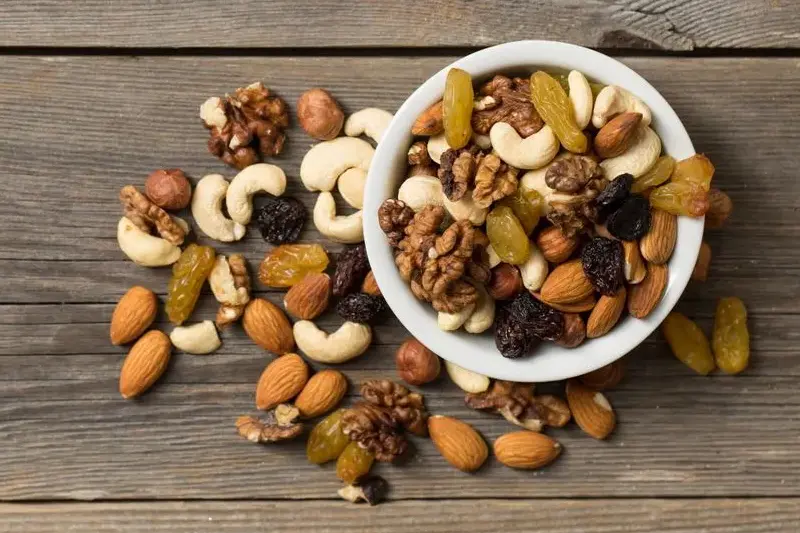
Seasonal and Educational Approach
We rotate the fruits, vegetables, and other ingredients based on seasonal availability to ensure that our snacks are fresh and nutritious. Additionally, our educational approach includes teaching children about the benefits of the different foods they eat. This empowers them to make healthy choices and understand the importance of a balanced diet.
By incorporating these healthy breaks into our daily routine, we aim to foster good eating habits and provide the essential nutrients needed for our children to thrive both physically and mentally. At Zenkids, we believe that a healthy body supports a healthy mind, and our snack schedule is a testament to our commitment to the well-being of our students.
Study of Nature
Our nature tables provide a captivating journey into the fascinating worlds of plants and animals, fostering an appreciation for the natural wonders that surround us.
World of Plants
The World of Plants table invites children to witness the magic of growth as they observe various plant species thriving in transparent pots. From seeds to root, stems, leaves, flowers, and fruits, children witness the entire life cycle firsthand. Alongside live plants, seasonal fruits, vegetables, flowers, spices, nuts, and legumes are displayed, each accompanied by a storyboard detailing their benefits and uses. Children also learn about plant care, including watering, sunlight needs, and maintenance practices.Additionally, storyboards provide general knowledge about plants, covering topics such as the classifications of trees based on their benefits.
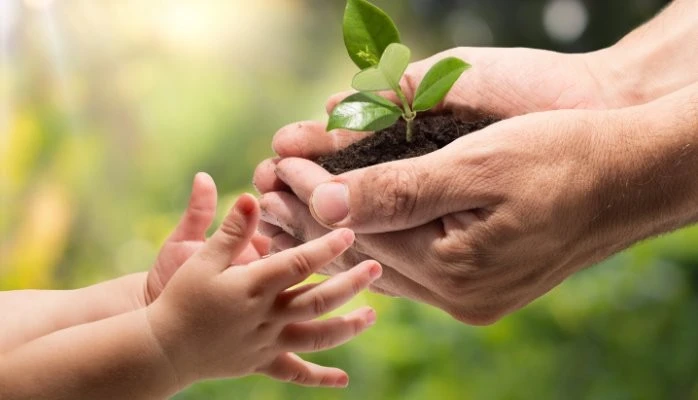
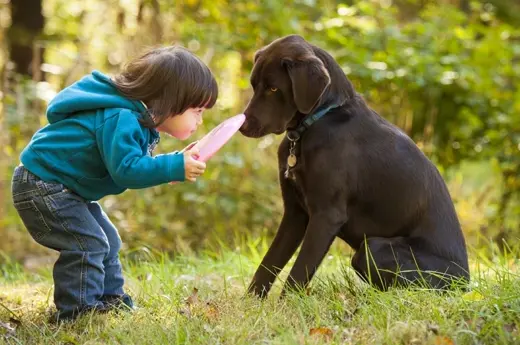
World of Animals
On the World of Animals table, children encounter a diverse array of creatures, from insects to small animals and birds. Through rotating displays and multimedia resources, they observe different animals' movements, sounds, and contributions to humankind. Storyboards offer insights into animals' benefits and the products derived from them. Children also learn about animal care, including dietary requirements and feeding practices. Additionally, storyboards provide general knowledge about animals, covering topics such as the largest, fastest, smallest, and slowest animals.
The World
The World study table is an extensive exploration that includes:
- Landforms and Minerals: Showcasing the diverse landscapes and geological treasures of our planet. Models of different landforms such as islands, lakes, isthmuses, mountains, valleys, plains, and plateaus, alongside specimens of minerals such as limestone, graphite, and silver, offer a tangible glimpse into Earth's geological diversity. Storyboards explain the benefits of landforms and minerals and the finished products derived from them.
- Physical and Political Geography: Children will learn about the globe, maps, continents, countries, states, capitals, and the flags of different countries. This section provides a comprehensive understanding of global geography, helping children appreciate the world's diversity and the interconnectedness of various regions and cultures.
- Weather, Seasons, Sky, Galaxy, and Solar System: Children explore the dynamic forces shaping our atmosphere, seasons, and celestial bodies through engaging displays and storyboards. They learn about weather patterns, seasonal changes, and the wonders of the sky, galaxy, and solar system. Understanding the benefits we derive from these natural phenomena fosters a sense of wonder and curiosity about the universe.

Through these nature study tables, children embark on a journey of discovery, deepening their understanding and appreciation of the natural world and the cosmos.
Nature Exploration for Pre-KG at Zenkids
At Zenkids, we believe that early exposure to the natural world is essential for fostering curiosity, understanding, and a love for learning. Our Pre-KG nature exploration program is designed to provide children with a comprehensive and interactive experience, focusing on the growth and parts of plants, animals, and humans, as well as the various minerals found in nature.
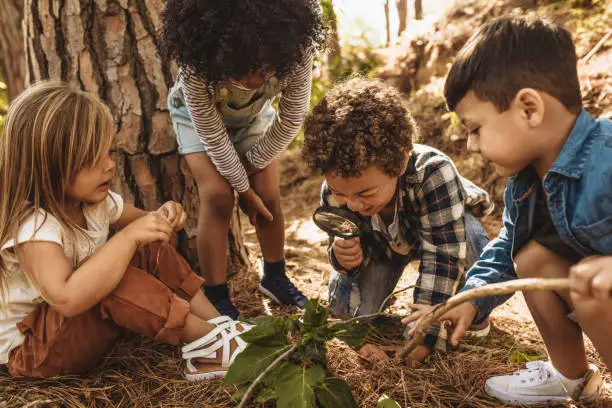
Enhanced Nature Tables and Guided Nature Walks
Growth of Plants, Animals, and Humans: Our enhanced nature tables are curated to showcase the fascinating growth processes of plants, animals, and humans. This setup includes:
- Plant Growth: Transparent pots allow children to observe the germination and growth stages of various plants, from seeds to mature plants. Storyboards provide detailed explanations of each stage.
- Animal Development: Models and multimedia resources illustrate the life cycles of different animals, helping children understand the stages of growth from birth to adulthood.
- Human Growth: Interactive displays and age-appropriate diagrams highlight the human growth process, emphasizing the importance of nutrition, exercise, and healthcare.
Parts of Plants, Animals, and Humans: The nature tables are equipped with detailed models and diagrams to help children learn about the different parts of plants, animals, and humans:
- Plants: Children can explore the structure of plants, identifying roots, stems, leaves, flowers, and fruits. Storyboards explain the functions of each part.
- Animals: Displays and interactive elements help children learn about the anatomy of various animals, focusing on external and internal parts.
- Humans: Simple and clear diagrams illustrate human anatomy, teaching children about the major organs and their functions.
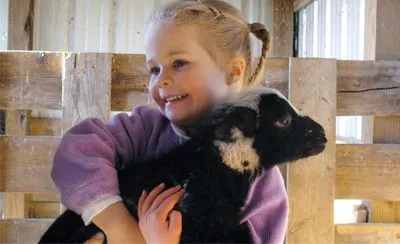
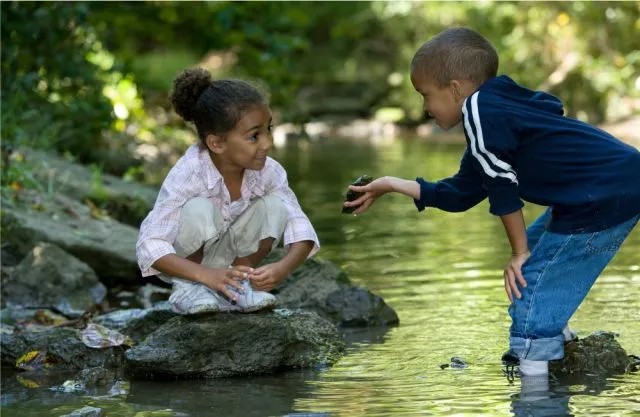
Various Minerals Available in Nature: Our nature tables also feature a diverse collection of minerals, accompanied by storyboards that explain their formation, characteristics, and uses:
- Mineral Samples: Children can touch and examine a variety of minerals, learning about their properties and how they are used in everyday life.
- Educational Storyboards: Detailed storyboards provide information on the origins of these minerals and their importance in nature and human activities.
Guided Nature Walks: To complement the indoor learning experience, we conduct guided nature walks that offer children real-world exposure to the natural environment:
- Observation and Interaction: During these walks, children observe plants and animals in their natural habitats, reinforcing their classroom learning.
- Practical Learning: Guides explain the significance of various natural elements encountered during the walks, making the learning experience more tangible and memorable.
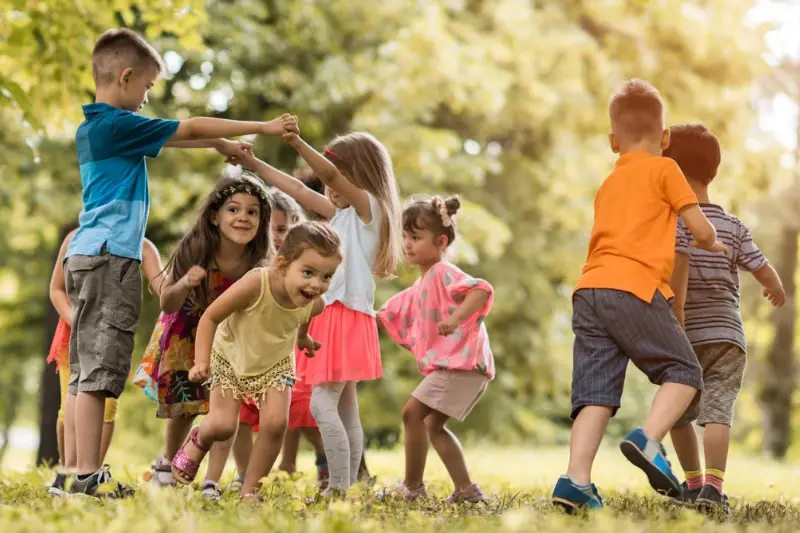
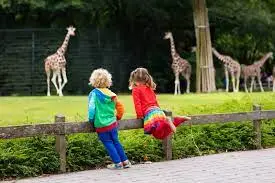
Field Trips to Enhance Experiential Learning
To extend our nature exploration program beyond the classroom, we organize field trips to nearby farms, parks, zoos, aquariums, and museums. These excursions provide hands-on learning experiences that are both educational and enjoyable:
- Farms: Children visit local farms to see plant growth processes and animal husbandry firsthand, learning about agricultural practices and the source of their food.
- Parks: Trips to parks allow children to observe diverse plant species and local wildlife, enhancing their understanding of ecosystems and the importance of environmental conservation.
- Zoos and Aquariums: Visits to zoos and aquariums give children the opportunity to see a wide range of animals and marine life, fostering an appreciation for biodiversity and the interdependence of species.
- Museums: Explorations in museums provide a deeper understanding of natural history, including exhibits on minerals, fossils, and the evolutionary history of plants and animals.
Benefits of Our Nature Exploration Program
- Holistic Understanding: Children gain a well-rounded understanding of the natural world, including the growth and anatomy of plants, animals, and humans, as well as the importance of minerals
- Hands-On Learning: Interactive nature tables and real-world observations through guided walks and field trips enhance sensory learning and retention.
- Curiosity and Critical Thinking: Engaging activities and firsthand experiences stimulate curiosity and encourage critical thinking about the natural environment.
- Appreciation for Nature: Early exposure to nature fosters a lifelong appreciation for the environment and the importance of conservation.
At Zenkids, our comprehensive nature exploration program for Pre-KG children is designed to inspire a love for learning and a deep respect for the natural world. Through interactive nature tables, guided nature walks, and enriching field trips, we aim to nurture inquisitive minds and instill a sense of wonder and responsibility towards the environment.
STEM Program
At Zenkids, our STEM program for PreKG is designed to foster an early love for science, technology, engineering, and mathematics through engaging, hands-on activities that integrate practical life skills and sensory refinement. Our program focuses on the care of the environment and the refinement of the senses, preparing children for future academic success in mathematics and language.
Practical Life Activities
Our practical life activities aim to teach children essential skills for caring for their environment. These activities include:
- Care of the Environment: Activities such as sweeping, mopping, washing chowki, washing cloth, washing shoes, caring for plants and animals, arranging flowers, setting the dining table, making garlands, and setting up pooja plates.
- Food Preparation: Simple food preparation tasks like making sandwiches, churning buttermilk, making lime juice, and preparing coffee.
These activities help children learn to care for their surroundings and acquire basic food preparation skills, fostering independence and responsibility.
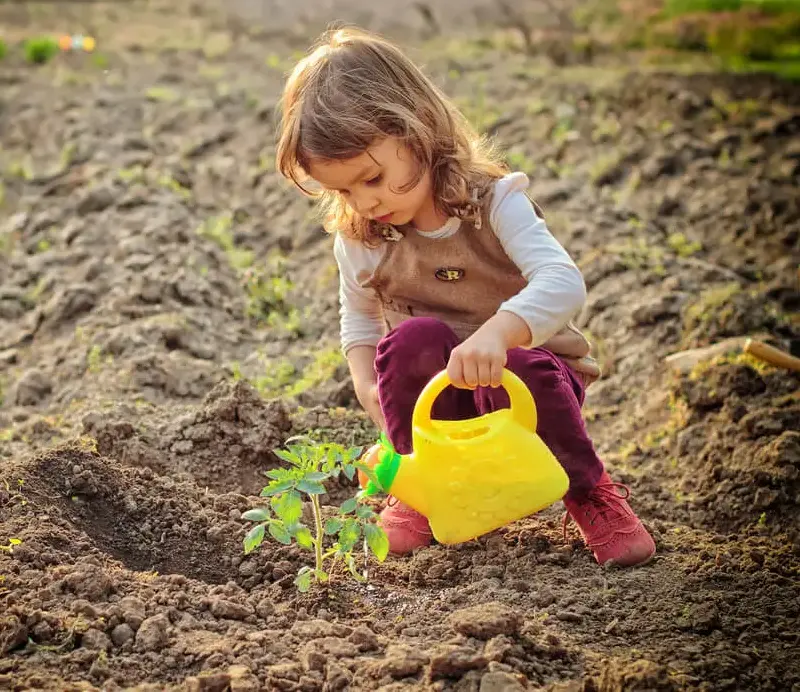
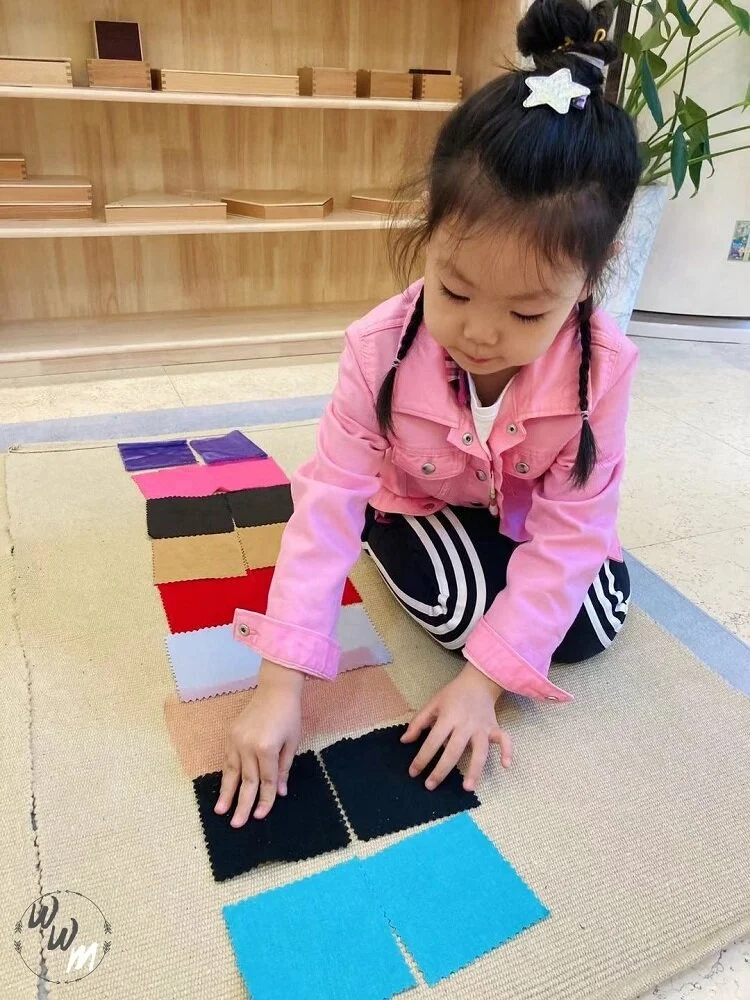
Sensorial Activities
We use scientifically prepared Montessori materials and a specially designed sensorial environment to refine the children’s senses, which include touch, olfactory, auditory, sight, gustatory, and stereognostic senses. This refinement is crucial for receiving high-quality information from the environment and serves as a foundation for understanding mathematics and language.
- Refinement of Visual Sense - Dimension: Materials like the cylinder box, pink tower, color tablets, brown stairs, and red rods help children understand dimensions. Our sensorial stage enhances visual learning through light reflection and making new colors by mixing primary colors.
- Refinement of Touch: Materials such as touch boards, touch tablets, fabric boxes, thermic tablets, and thermic bottles help refine the sense of touch. Our sensorial floor features different gradations of roughness to smoothness, allowing children to feel various textures while walking. The environment itself is designed to refine the senses as children move and explore.
- Refinement of Auditory Sense: Using sound boxes and bells, children learn to differentiate sounds. Our sensorial stage allows them to create sounds by beating objects and blowing air in hollow spaces, providing a rich auditory experience.
- Refinement of Gustatory Sense: Tasting bottles help children refine their sense of taste.
- Refinement of Olfactory Sense: Smelling bottles and the natural fragrance of flowers in our environment enhance the sense of smell.
Our sensorial stage and floor are designed to meet scientific standards, ensuring that the environment itself actively refines the senses of the child simply by being present in it.
Structured Learning Environment
Activities are organized in a sequence based on complexity and logical order. Children engage in a complete cycle of taking materials from the shelf, exploring them, winding up, and putting them back. With one set of materials per activity, children learn to wait for their turn and respect others' work and the materials.
Development Outcomes
By the end of the nursery program, children will have developed:
- Muscle strength
- Focus and concentration
- Independence
- Respect for others and their work
- Patience and turn-taking
- Grace and courtesy in their movements and interactions
- Foundation for Language and social interactions
The STEM program for Nursery at Zenkids is designed to introduce young children to the wonders of the world around them while laying the foundation for future academic pursuits. Through a variety of engaging activities focused on practical life skills and sensorial experiences, children develop essential skills for understanding mathematics and language.
By engaging in activities that promote environmental care and refine their senses, children not only learn about the world but also develop important life skills such as independence, social interaction, and respect for others. The structured learning environment encourages exploration, creativity, and collaboration, fostering a love for learning from an early age.
Through the Nursery STEM program, children develop a range of skills, including refinement of senses, independence, social interaction, and foundational knowledge in mathematics and language. With this holistic approach to early education, children are empowered to become curious, confident learners ready to embark on their educational journey.
Language Development
At Zenkids, our Language Development Plan for Pre-KG is meticulously designed to prepare children for the physical aspects of writing and to develop their literacy skills in an engaging and systematic manner. Our activities focus on enhancing fine motor skills, letter recognition, and the ability to form sentences. The key activities include:
- Tracing Sandpaper Letters:
Children trace sandpaper letters with their fingers to register the stroke and shape of each letter. This tactile activity helps in building muscle memory and reinforces letter recognition through multisensory learning. - Phonetic Sound to Letter Mapping Using Movable Alphabets:
Using movable alphabets, children learn to form sentences based on phonetic sounds. This activity promotes an understanding of the relationship between sounds and letters, aiding in early reading and writing skills. - Metal Insets for Drawing Lines:
Metal insets are used to draw lines within boundaries. This activity helps children develop control over their hand movements and improves their ability to draw shapes and patterns, which are foundational skills for writing. - Placement of Letters on Four-Line Paper:
Children learn to place letters correctly on four-line paper based on the stroke of each letter. This activity emphasizes proper letter formation and alignment, ensuring children understand the spatial arrangement of letters. - Grouping Alphabets into Letter Families:
Alphabets are grouped into letter families on four-line paper based on their strokes. This categorization helps children recognize patterns in letter formation and aids in consistent writing practice. - Writing Letters on Plain Paper:
Children practice writing letters on plain paper without boundaries. This activity encourages freehand writing and boosts confidence as children transition from guided practice to independent writing.

Through these carefully structured activities, we aim to develop not only the physical aspects of writing but also a love for language and literacy. Our approach ensures that each child progresses at their own pace while gaining the necessary skills for beautiful and effective writing.
Storytelling and Poem Recitation
At Zenkids, storytelling and poem recitation are central to our language development plan for nursery children. These activities not only enrich oral language skills but also play a crucial role in inculcating good habits, manners, and values essential for a well-rounded upbringing.
Benefits of Storytelling and Poem Recitation
- Language Enrichment: Regular storytelling sessions and poem recitations expose children to new vocabulary, sentence structures, and expressions, enhancing their linguistic abilities.
- Listening Skills: By actively listening to stories and poems, children develop better attention spans and listening skills, which are critical for effective communication.
- Imagination and Creativity: Engaging narratives and poetic verses stimulate children's imagination and creativity, encouraging them to think beyond the literal and explore abstract concepts.
- Moral Values: Through carefully selected stories and poems, children learn important moral values and life lessons in an engaging and memorable way.
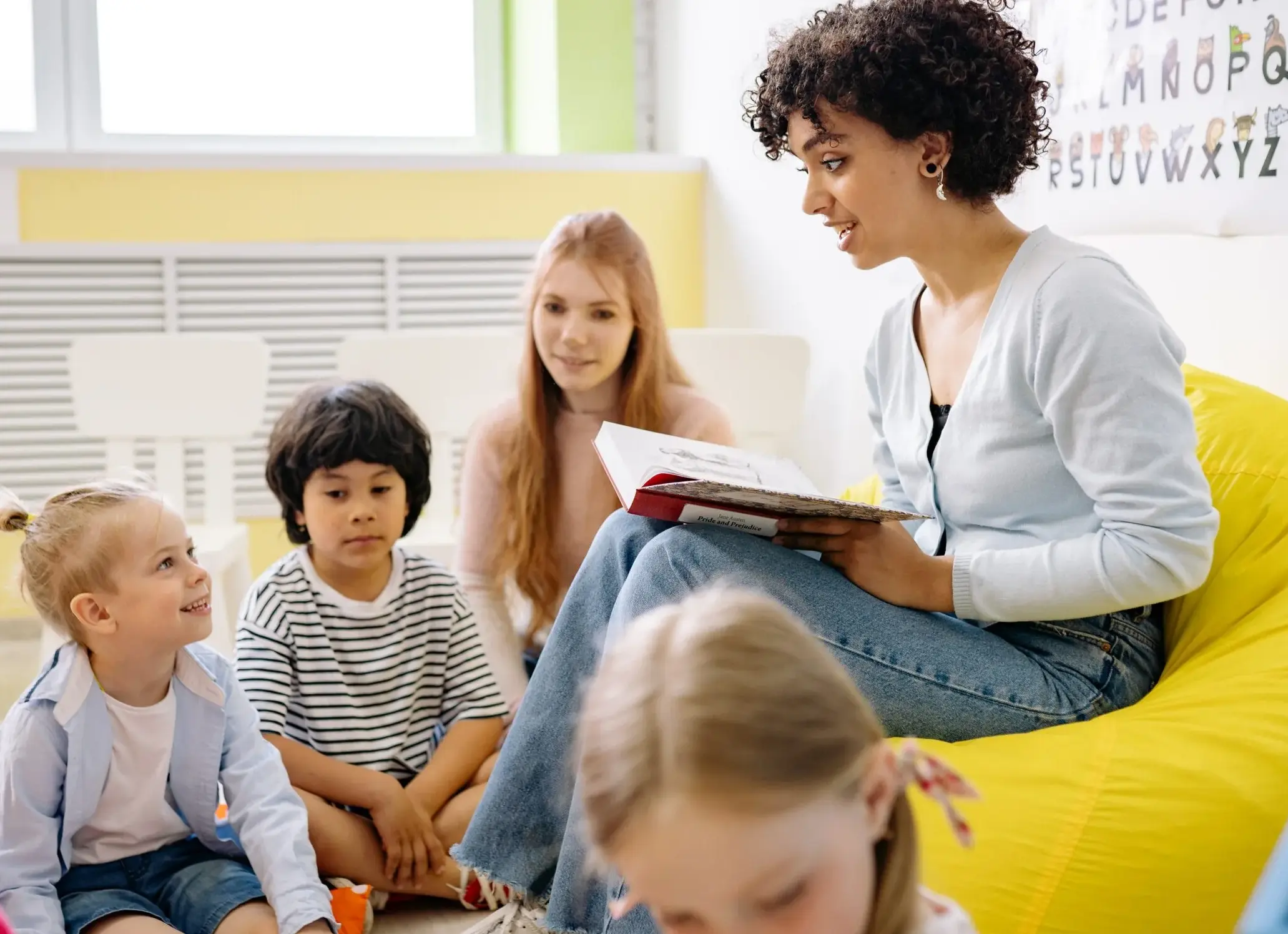

Activities and Implementation
- Daily Storytelling Sessions: We conduct daily storytelling sessions where children listen to a variety of stories, ranging from traditional tales to contemporary narratives. These sessions are designed to be interactive, with children encouraged to ask questions and discuss the stories.
- Poem Recitation: Regular poem recitation sessions introduce children to the rhythm, rhyme, and musicality of language. Children participate by reciting poems individually and in groups, enhancing their memorization and public speaking skills.
- Age-Appropriate Thirukural Stories: We plan to translate the wisdom of Thirukural into age-appropriate stories. These stories will convey valuable life lessons and ethical principles through engaging and relatable narratives, making ancient wisdom accessible to young minds.
- Interactive Storytelling: In addition to traditional storytelling, we incorporate interactive elements such as role-playing, puppet shows, and story-related crafts. These activities make the storytelling experience more immersive and enjoyable.
- Multilingual Support: : Our storytelling and poem recitation activities are conducted in English, Tamil, and Hindi, ensuring that children develop language skills in multiple languages and appreciate the richness of different linguistic traditions.
Expected Outcomes
- Enhanced Language Skills: Children will develop a strong foundation in language, improving their vocabulary, comprehension, and expressive abilities.
- Moral and Ethical Development: Through the stories and poems, children will internalize important values and develop a sense of right and wrong.
- Confidence and Communication: Regular practice in listening, reciting, and discussing will build children's confidence in expressing themselves and improve their overall communication skills.
At Zenkids, we believe that storytelling and poem recitation are powerful tools for language development and character building. By integrating these activities into our curriculum, we aim to nurture well-rounded individuals who are not only proficient in language but also embody the values and virtues essential for a fulfilling life.

